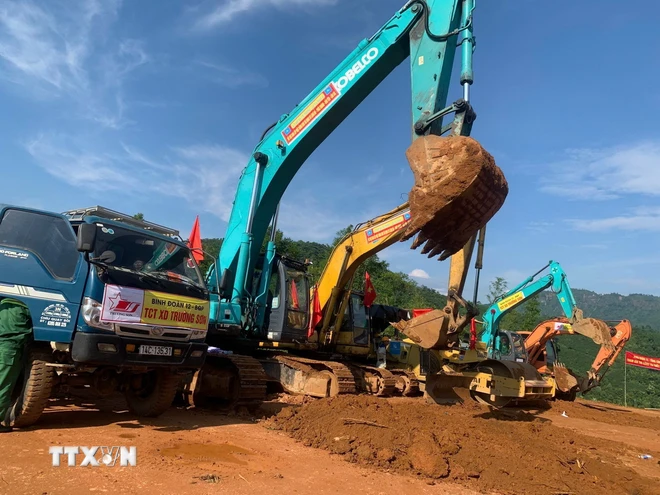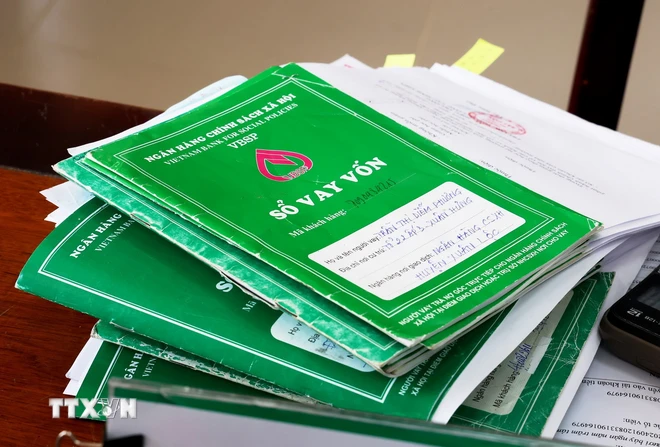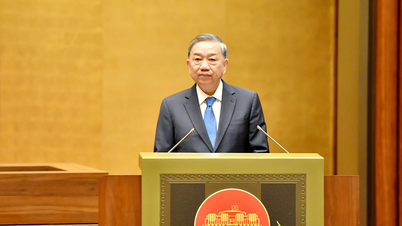The solid economic foundations are the basis for international organizations to maintain Vietnam's growth forecasts this year and next.

In the context of global economic instability, Vietnam's economy continues to recover steadily, with inflation moving in a more favorable direction.
The solid economic foundations are the basis for international organizations to maintain Vietnam's growth forecasts for this year and next, despite the recent storm No. 3 ( Yagi ) causing temporary disruptions, with significant damage.
The economic foundation is maintained
On September 25, the Asian Development Bank (ADB) released its Asian Development Outlook (ADO) report for September 2024, maintaining its forecast for Vietnam's economic growth prospects in 2024 and 2025 at 6% and 6.2%, respectively.
ADB Country Director for Viet Nam Shantanu Chakraborty said Viet Nam’s economy rebounded strongly in the first half of 2024 and will continue to grow despite global uncertainties. The steady recovery is the result of improved industrial production and strong trade.
The industrial sector continued to be the main driver of growth, as external demand for key electronics exports contributed to increased production.
The recovery is also supported by the recovery of the service sector and stable agricultural output. In the 8 months (1-8/2024), exports and imports recovered strongly, increasing by 15.8% and 17.7% respectively compared to the low base of the same 8 months of 2023.

Uncertainty over the continued restructuring of regional and global supply chains has weighed on the trade outlook.
ADB forecasts Vietnam's inflation to be at 4% in 2024 and 2025, although geopolitical tensions, including conflicts in the Middle East and Russia-Ukraine, could impact oil prices and potentially increase inflation.
Meanwhile, HSBC maintained its forecast for Vietnam’s GDP growth for both 2024 and 2025 at 6.5%, saying that potential upsides could offset the temporary economic losses caused by Typhoon Yagi.
Vietnam's economy is expected to witness stronger growth thanks to a steady recovery, a strong manufacturing sector and more favorable inflation.
According to HSBC, GDP growth improved and surprised in the second quarter of 2024, reaching 6.9% compared to the same period last year. The manufacturing sector recovered strongly and broke the sad situation of last year.
The purchasing managers’ index recorded five consecutive months in expansion territory, while the industrial production index also recorded a recovery in activity in the textile and footwear industries. This resulted in strong double-digit export growth.
In addition, important external drivers are also on the way, such as expanding market access for Vietnamese agricultural products.
Regarding inflation, HSBC experts said that price developments are trending more favorably in the last 6 months of the year when the base effect is not favorable due to the gradual decrease in energy prices.
An easing cycle by the US Federal Reserve (Fed) would also help ease pressure on exchange rates.
Considering all the above factors, HSBC maintains its 2024 inflation forecast at 3.6%, quite low compared to the State Bank's target ceiling of 4.5%.
The bank's Global Research division also kept its inflation forecast for 2025 at 3%.

Taking into account the impact of Typhoon Yagi, reconstruction efforts and a higher base in the second half of 2023, UOB Bank, Singapore has revised down its forecast for Vietnam's full-year 2024 GDP growth to 5.9%, down about 0.1 percentage points from its previous forecast of 6%.
Apart from temporary disruptions due to the storm, UOB assesses that the long-term fundamentals of the economy remain quite solid.
UOB's full-year growth forecast for Vietnam's economy in 2024 has been lowered but is still seen as a positive recovery from the 5% growth in 2023.
In addition, UOB also revised its GDP growth forecast for 2025 upward by about 0.2 percentage points to 6.6%, reflecting an expected increase to offset previous declines.
Some risks
The ADO report also highlights a number of risks that could slow Vietnam’s growth momentum. External demand in some major economies remains weak, while geopolitical tensions, rising protectionism and uncertainties related to the US election in November could lead to trade fragmentation, negatively affecting exports, manufacturing and employment.
In addition, weak domestic demand and a difficult global economic outlook will add to the uncertainty.
Furthermore, the Fed's interest rate cut, along with similar moves made by the European Central Bank (ECB) earlier, are also factors that could weaken Vietnam's exports.

According to HSBC, domestic economic activities are recovering more slowly than initially expected, with retail growth still below pre-pandemic trends. Encouragingly, the government has taken many measures to support a range of domestic economic sectors, thereby creating expectations that confidence will gradually recover.
HSBC also pointed out some major risks for the Vietnamese economy such as the particularly severe consequences of super typhoon Yagi, sudden fluctuations in world energy prices, food prices, and the recovery level of global commodity demand, especially in Europe.
In the recently released report “Economic Outlook for Q3/2024”, UOB Bank stated that the impact of Typhoon Yagi on Vietnam will be felt more clearly in late Q3/2024 and early Q4/2024 in the northern regions.
The impact will be felt through lost output and damaged facilities across sectors such as manufacturing, agriculture and services.
Policy recommendations
ADB experts recommend that Vietnam should boost domestic demand through stronger fiscal stimulus measures such as accelerating public investment, while maintaining low interest rates. A combination of policies is needed to promote economic recovery, given relatively stable prices and weak demand.
Vietnam’s monetary policy is expected to continue to focus on the dual objectives of price stability and growth support, despite limited policy space. However, the risk of rising bad debts due to the continued extension of debt restructuring regulations limits the scope for further monetary easing.

Any additional monetary policy easing should be closely coordinated with expansionary fiscal policy, along with accelerating institutional reforms to support the economy.
ADB Chief Economist Nguyen Ba Hung recommends that to maintain growth momentum in 2024 and 2025, ensuring macroeconomic stability with a more balanced combination of monetary and fiscal policies, along with comprehensive governance reforms, is crucial. Weaker-than-expected external demand requires continued policy measures to boost business activity to stimulate domestic demand.
The ADB expert further pointed out that the State Bank of Vietnam continues to pursue a flexible monetary policy to facilitate low-cost financing to support growth.
Mr. Shantanu Chakraborty recommended that the Government should accelerate the disbursement of public investment capital and support policies to boost the economy of localities affected by storms and floods. Public investment disbursement is usually accelerated at the end of the year and this will be the main driving force to boost Vietnam's economy this year.
Commenting on the efforts to rebuild the Vietnamese economy after the severe damage caused by Typhoon Yagi and its aftermath, Mr. Nguyen Ba Hung said that the best mechanism for reconstruction is to rely on insurance and budget support sources such as public investment. In addition to the direct relief package of up to 350 billion VND from the Vietnamese Government and the consensus of the entire population as well as international friends, Mr. Nguyen Ba Hung said that insurance will be a resource that directly contributes to the process of asset recovery.
He cited the US experience with Hurricane Katrina in 2005. At that time, economic losses amounted to about $120 billion, of which the insurance industry covered about $40 billion.
In addition, forms of budget support such as public investment related to post-disaster infrastructure construction and agricultural production support are also very important./.




![[Photo] The Government Standing Committee works with ministries and branches on the real estate market situation.](https://vphoto.vietnam.vn/thumb/1200x675/vietnam/resource/IMAGE/2025/5/24/e9b5bc2313d14c9499b8c9b83226adba)
![[Photo] Ho Chi Minh City holds funeral for former President Tran Duc Luong](https://vphoto.vietnam.vn/thumb/1200x675/vietnam/resource/IMAGE/2025/5/24/9c1858ebd3d04170b6cef2e6bcb2019e)

































![[Photo] Party and State leaders visit former President Tran Duc Luong](https://vphoto.vietnam.vn/thumb/1200x675/vietnam/resource/IMAGE/2025/5/24/960db9b19102400e8df68d5a6caadcf6)




























































Comment (0)